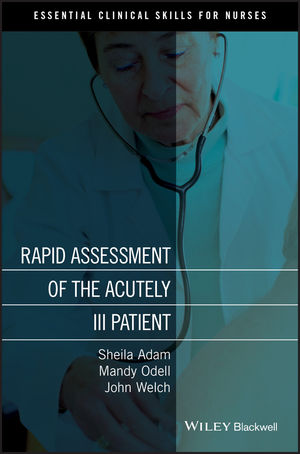Rapid Assessment of the Acutely Ill PatientISBN: 978-1-4051-6993-6
Paperback
248 pages
January 2010, Wiley-Blackwell
 |
||||||
Rapid Assessment of the Acutely Ill Patient sets out the
principles and practices needed for early recognition and
assessment of patients either at risk of or showing signs of
acute deterioration, or those recently relocated from higher
levels of care. The focus is on patient assessment, interpretation
and evaluation of data, immediate management of significant
problems, ongoing and further assessments in order to improve
clinical outcomes.
Rapid Assessment of the Acutely Ill Patient provides a framework for a systematic initial patient assessment and explores principles of effective assessment. Body systems are considered in order of life-threatening priority following the ABCDE approach, dealing with the assessment and management of airway, breathing, circulation, disability - and everything else; covering topics such as visual, palpatory and auscultatory assessment, use of additional documented information (charts, notes etc), and interpreting diagnostic investigations. Methods to ensure effective communication and team-working are also discussed.
Rapid Assessment of the Acutely Ill Patient provides a framework for a systematic initial patient assessment and explores principles of effective assessment. Body systems are considered in order of life-threatening priority following the ABCDE approach, dealing with the assessment and management of airway, breathing, circulation, disability - and everything else; covering topics such as visual, palpatory and auscultatory assessment, use of additional documented information (charts, notes etc), and interpreting diagnostic investigations. Methods to ensure effective communication and team-working are also discussed.
Key features
-
Part of the Essential Clinical Skills for Nurses series
-
Aimed at nurses working in wards and specialist departments
-
Explores the assessment skills required for a rapid response to a patient at risk of becoming acutely unwell
-
Enables students and practitioners to develop practical and interpretative skills
-
Provides a framework for assessment and principles of first line treatment
-
Includes ‘Look’, ‘Listen’, ‘Feel’ and ‘Measure’ icons
Sheila Adam is Head of Nursing, Specialist Hospitals
Board, UCL Hospitals NHS Foundation Trust and author of Nursing in
Critical Care: Science and Practice (now in its 2nd edition), The
Oxford Handbook of Critical Care Nursing and Nutrition in the
Critically Ill.
John Welch is Nurse Consultant in Critical Care, University
College London Hospitals NHS Foundation Trust, and former Chair of
the National Outreach Forum.
Mandy Odell is Nurse Consultant in Critical Care, Royal
Berkshire NHS Foundation Trust, Nurse and Allied Health
Professional representative for the Intensive Care Society and
former Chair of the British Association of Critical Care
Nurses.



